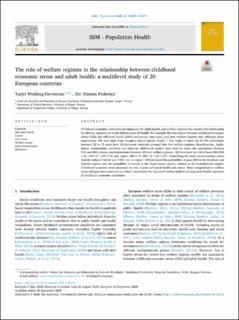The role of welfare regimes in the relationship between childhood economic stress and adult health: a multilevel study of 20 European countries
Journal article, Peer reviewed
Published version

Åpne
Permanent lenke
https://hdl.handle.net/11250/2727156Utgivelsesdato
2020Metadata
Vis full innførselSamlinger
- Department of Clinical Medicine [2066]
- Registrations from Cristin [9791]
Sammendrag
Childhood economic conditions are important for adult health, and welfare regimes may modify this relationship by altering exposure to social determinants of health. We examine the association between childhood economic stress (CES) and self-rated health (SRH) and cancer (any type), and how welfare regimes may influence these associations. We used data from European Social Survey round 7. Our study is based on 30 024 individuals between 25 to 75 years from 20 European countries grouped into five welfare regimes (Scandinavian, Anglo-Saxon, Bismarckian, Southern and Eastern). Multilevel models were used to assess the association between CES and SRH/cancer, and interactions between CES and welfare regimes. CES increased the risk of poor SRH (RR 1.41, 95% CI 1.29–1.54) and cancer (RR 1.19, 95% CI 1.02–1.37). Controlling for adult socioeconomic status slightly reduced risk for poor SRH, but not cancer. CES increased the probability of poor SRH in the Southern and Eastern regime, and the probability of cancer in the Anglo-Saxon regime, relative to the Scandinavian regime. Childhood economic stress increases the risk of poor self-rated health and cancer. More comprehensive welfare states mitigate these associations, which emphasizes the impact of welfare policies on long-term health outcomes of childhood economic conditions.
